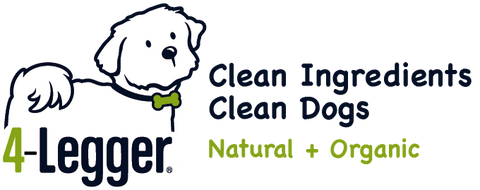The High Price of Low Cost Dog Shampoo
When it comes to grooming our canine companions, many pet parents opt for affordable solutions, particularly when shopping for dog shampoo.
Unless your dog has allergies to ingredients and it causes itchy skin, it is difficult to see the long term impact of using cheap ingredients year after year.
The holistic community has started to be vocal about EVERY ingredient - whether it is in food, treats, yard treatments, laundry detergent, carpet cleaner, dog cologne, or dog shampoo - ALL being incredibly important to the long term health of your dog.
Why?
Ingredients are cumulative.
This means that these substances do not get fully broken down or excreted immediately and instead build up in the body's tissues or organs (bioaccumulation).The long term impact of bioaccumulation is pet parents saying... "When my dog turned 9, he suddenly got sick with (fill in the blank)"?
That blank could be a myriad of diseases from endocrine disruption, food sensitivities, dry skin, unhealthy skin sebum, unhealthy skin microbiome, and even cancer.
Low Cost = Cheap Synthetic Ingredients
The lower price tags of these products can mask a troubling reality: The use of cheap synthetic detergents almost certainly will harm your pet's long term health.
In this article, we'll delve into the world of dog shampoos, comparing the common ingredients found in low-cost options to the natural and organic components of 4-Legger all natural dog shampoos.
The Perils of Cheap Synthetic Ingredients
Low-cost dog shampoos rely on synthetic detergents for their cleansing properties.
Manufacturers love these ingredients because they’re cheap to source and make them lots of money.
These ingredients, while effective at removing dirt and grime, can be harsh on a dog's sensitive skin.
They may also be contaminated with ingredients that have links to known health issues.
Common synthetic components like Sodium Lauryl Sulfate (SLS) and parabens are known for their potential to cause skin irritation, dryness, and allergic reactions. Moreover, these substances can strip away the natural oils from a dog's coat or clog the natural skin pores, leading to a dull and brittle appearance later in life.
Cocamidopropyl betaine is a synthetic surfactant associated with irritation and allergic contact dermatitis. Reactions could be due to the ingredient itself or impurities. Nitrosamines, a common contaminant, are known to cause cancer.
The lower the price tag on the shampoo, the more likely contaminants are still in that shampoo because removing impurities costs money and those manufacturers don’t want to shrink their profit margins resulting in higher costs for the consumer.
The preservatives in synthetic shampoos may cause significant concern.
DMDH Hydantoin is a preservative that slowly releases small amounts of formaldehyde over time. Many dogs have or can develop formaldehyde allergies/sensitivities. It also may cause skin or eye irritation. Worst of all, formaldehyde is also linked to cancer.
Natural Ingredients Are More Expensive
The 4-Legger Difference: In stark contrast, 4-Legger organic dog shampoos offers a gentler and healthier alternative.
4-Legger makes only all natural dog shampoo formulated with saponified organic oils of coconut, olive, and jojoba, which are known for their moisturizing and nourishing properties. These oils not only clean the coat but also maintain the natural oil balance, ensuring a healthy shine.
While these ingredients cost more, they do not have links to long term health issues and they do not bioaccumulate in the body.
Essential Oils: The inclusion of essential oils in 4-Legger organic dog shampoos provides additional benefits. You can read about the benefits of each shampoo on their product pages.
Aloe Vera for Skin Health: Another key ingredient in 4-Legger dog shampoo is organic aloe vera, widely recognized for its soothing and healing properties. It helps in calming irritated skin and providing relief from itching.
Rosemary extract: Serves as a natural preservative and offers antioxidant benefits, protecting the skin from environmental stressors.
Pet Shampoo Ingredient Database
The Pet Shampoo Ingredient Database is a comprehensive and user-friendly resource, designed for pet owners, groomers, and veterinarians to access detailed information about the ingredients used in pet shampoos.
This database offers insights into the safety, efficacy, and potential allergens of various ingredients.
With its easy-to-navigate interface, users can quickly find information about specific ingredients, including their common uses, benefits, and any known risks or side effects. This tool is invaluable for ensuring the health and well-being of pets, allowing for informed decisions when selecting grooming products.
The bottom line is this: There is no such thing as, “my dog was always healthy and then all of a sudden he got sick”. There is no “all of a sudden”. One thing that is very nearly certain is that if you have a dog, you are either going to pay a little more for prevention by choosing high quality products beginning when they are a puppy, or you are going to pay a lot more for treatment when your dog gets sick after a lifetime of exposure to cheap, low quality ingredients. Saving a few bucks along the way is nothing compared to the thousands that will be spent on treatment if your dog gets sick as a result. It’s also nothing compared to the heartbreak of watching your dog struggle with chronic illness and possibly even a shortened life. I know. I’ve made these mistakes. We developed 4-Legger to give you a safe, healthy option to minimize these types of health risks for your beloved companion.
Summary
While the initial cost of low-cost dog shampoos may seem appealing, their cheap synthetic ingredients can lead to potential health issues and long-term costs.
In contrast, 4-Legger's all-natural and organic dog shampoo, with its blend of organic oils, essential oils, aloe vera, and rosemary extract, presents a safer, healthier, and more sustainable option for your furry friend. Investing in a quality shampoo like 4-Legger not only ensures the wellbeing of your pet but also contributes to a more environmentally conscious approach to pet care.





